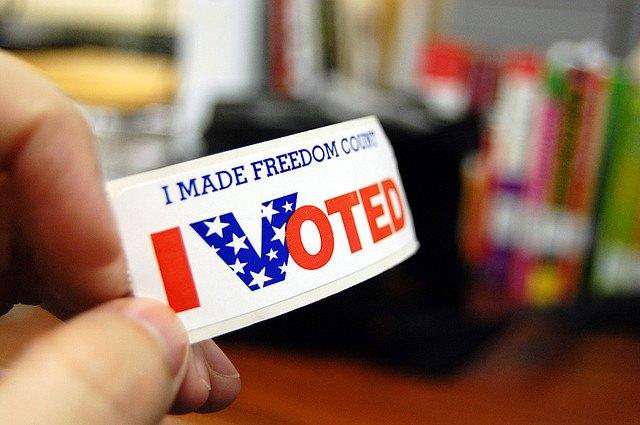
By Ava Kelly
Millennials are now the largest voting demographic in the country, yet in every conversation I have with political campaign managers, media specialists and grassroots organizers, I keep hearing the same sentiment:
“What’s the point of targeting millennials? They don’t vote.”
The truth is that 45 percent of eligible voters ages 18 to 29 did vote in the 2012 presidential elections (compared with the national voter turnout rate of 57.5 percent), but it’s clear we still have much work to do. To address this, we need to look at the “why.” The reason millennials “don’t vote” — as these folks bluntly put it — is because no one is talking to them. They don’t feel like they matter, and they certainly don’t feel like their voices are being heard.
If candidates want young people to volunteer, fundraise, spread the word and ultimately vote for them, a good starting point would be to stop ignoring and start tapping into millennials’ unique communication preferences.
Motivated by issues, not parties
Millennials are issue-driven — not party-driven — and they expect to be engaged and empowered in political conversations. They are deeply concerned about the economy and the environment, and they have strong opinions on topics like gun violence and LGBT rights.
When seeking to involve them in political conversations, campaigns need to keep in mind that this generation grew up in a digital age of frictionless user experiences. They don’t allow TV schedules to dictate what they watch; they pick and choose shows on Netflix. They don’t go to the DMV to renew their licenses; they do it online. Apps allow them to order wine and groceries or find romantic partners from the comfort of their living rooms. Why would they want to function any differently when it comes to civic engagement?
Young people are not seeing political ads on TV or attending town hall meetings; they’re living on their phones and in digital communities. I promise you: If you communicate with millennials through digital media platforms, they won’t just listen — they’ll engage! They’re eagerly waiting for candidates to start a live stream on YouTube or a Reddit AMA (Ask Me Anything) discussing the issues they care about.
Digital — not TV — is a must
Earlier this primary season, a group of YouTube celebrities were invited to be a part of a democratic debate on NBC. While I deeply appreciate this gesture, the media missed the point here. Yes, NBC appeared to be reaching out to young voters by involving digital talent, but they weren’t performing on their native platform. Meaning, millennial voters were also being asked to move away from their preferred medium.
If you want to motivate young people, you need to go to them on their terms. The “YouTube celebrity” strategy would have been vastly more successful had the politicians created content in collaboration with popular YouTube channels regarding topics like LGBT rights, the economics of life as a 20-something or environmental issues.
In another misguided attempt to reach young people, the 2016 candidates are spending crazy amounts of money on hyper-targeted online ads, breaking the $1 billion mark for the first time ever. Aside from the fact that ad-blocking software is most popular among the millennial demographic, digital ads also come across as inauthentic and tacky. It tends to feel like candidates are smacking millennials in the face with strongly-worded pledges and insults while attempting to buy their way into their hearts and minds.
Speak to millennials through content
Millennials consume digital content — not advertisements. Articles, videos and images excite, engage, and create communities within this demographic.
The main point of difference between content and advertisement involves the value proposition. Advertisements provide value to the advertiser, while content provides value to end users via new information, resources or perspectives. Also, it encourages them to continue the conversation through likes, comments, shares and specific calls to action.
When it comes to learning about and discussing politics, most millennial activity is occurring on social media — particularly YouTube. As I said earlier, politicians would be best served crafting and posting content on these sites, rather than trying to find ways to coax millennials toward their preferred mediums.
By creating a pathway for advocacy organizations and political agencies to engage digital media influencers on their native platforms, we can at least start conversations and begin to engage young people in ways previously thought impossible. Millennials want to be involved in the process — let’s lean in to their platforms and make that a reality.
Young voters need conversations that engage them on platforms they resonate with. That means bringing up the right topics, presenting them through the right avenues, and encouraging them to speak their minds and take action.
Once politicians follow that playbook, “millennials don’t vote” will be a phrase of the past.
Image credit: Flickr/Kelley Minars
Ava Kelly is an artist, change agent, educator, digital strategist, manager of Reelio Cares, and founder and CEO of Love Notes Records. While working on a project at the YouTube Space LA, Ava met Pete Borum, CEO of Reelio, and knew this was the platform that had the potential to change the way nonprofits and brands marketed their causes in the digital space. Since coming on with Reelio, Ava has brought more than 20 nonprofits and 500 people together at the YouTube Space to connect and learn about how nonprofits can leverage the platform and implemented YouTube campaigns with the biggest YouTubers, biggest nonprofits, and biggest brands to develop a culture of social responsibility in the digital space.
TriplePundit has published articles from over 1000 contributors. If you'd like to be a guest author, please get in touch!














